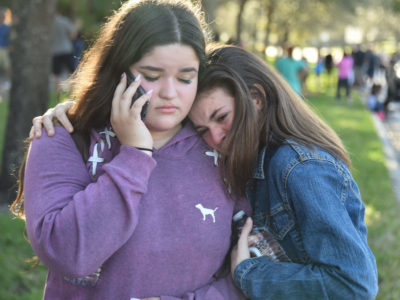Recently I attended an American Academy of Pediatrics gathering of pediatricians representing state chapters from around the country.
One of the major topics was gun violence and its impact on children. We heard from leaders in Connecticut, South Carolina and Florida about the impact on child health following mass shootings in recent years and how pediatricians in those states dealt with the concerns of children and parents.
The leaders from Maryland returned home not knowing that only two days later they would need to use what they learned in response to yet another shooting in a school. For Georgia, it is not a question of if we will have a mass shooting, but when.

The numbers are staggering:
** Every day, on average, more than 300 people in the U.S. are shot and 96 die
** Every day, 46 children are shot and 7 die (4 murders, 3 suicides)
** Every year, gun violence results in more than 12,000 murders, more than 21,000 suicides and 500 accidental deaths
For many years the United States has allowed widespread access to firearms based on the theory that more guns make us safer. 35,000 gun deaths each year have proved that hypothesis false.
With each mass shooting, there are renewed calls to stem the tide of gun violence, but little changes. Mass shootings capture the public’s attention, but it is the daily carnage that should horrify us. Nearly 1,000 kids kill themselves with guns annually because guns are efficient killers; 80 percent to 90 percent of suicide attempts by gun are successful compared to less than 20 percent of attempts by prescription overdose.

Pediatricians play a leading role in lowering the risk of gun injury and death for children. An appeals court ruling in 2017 solidified our right to ask patients if there are guns in the home and encourage parents to remove guns from the home or at least store firearms safely by locking them in a safe with the ammunition locked separately.
Research shows that children living in a home with guns are more likely to be victims of gun violence. Research also shows that guns in the home are much more likely to injure and kill a family member than a stranger or intruder. Guns in the home endanger children rather than make them safer. Pediatricians encourage parents to ask about guns before sending a child to play at a friend’s home; asking prevents tragedies and saves parents unimagined guilt and grief.
Gun proponents such as the National Rifle Association like to trot out the adage that “Guns don’t kill people; people kill people.” When it comes to the epidemic of gun violence, maybe it is not guns themselves that are the problem, but the love of guns.
Some students who survived the shooting in Parkland, Fla., inspired their peers to walk out of class last month to protest gun violence. They inspired kids and parents to take to the streets in March for our Lives events around the country to demand that our legislators take meaningful action to combat gun violence.
As a pediatrician, I am proud that the youth of our country are leading these efforts. The time to act is now; every day that we wait another 46 children are shot and another 7 die.
Bob Wiskind is a General Pediatrician who has practiced at Peachtree Park Pediatrics in Atlanta for more than 25 years. He cares for children from birth to age 21, including some second-generation families.

